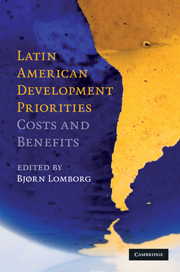Book contents
- Frontmatter
- Contents
- List of figures
- List of tables
- List of contributors
- Acknowledgments
- Abbreviations and acronyms
- Expert panel findings
- Introduction
- Democracy
- Education
- Employment and social security
- Environment
- Fiscal problems
- Health
- Infrastructure
- 7 High logistics costs and poor infrastructure for merchandise transportation in the LAC region
- 7.1 High logistics costs and poor infrastructure for merchandise transportation: an alternative view
- Poverty
- Public administration
- Violence and crime
- Conclusion
- References
7.1 - High logistics costs and poor infrastructure for merchandise transportation: an alternative view
Published online by Cambridge University Press: 05 June 2012
- Frontmatter
- Contents
- List of figures
- List of tables
- List of contributors
- Acknowledgments
- Abbreviations and acronyms
- Expert panel findings
- Introduction
- Democracy
- Education
- Employment and social security
- Environment
- Fiscal problems
- Health
- Infrastructure
- 7 High logistics costs and poor infrastructure for merchandise transportation in the LAC region
- 7.1 High logistics costs and poor infrastructure for merchandise transportation: an alternative view
- Poverty
- Public administration
- Violence and crime
- Conclusion
- References
Summary
This alternative view is meant to provide critical comments on Gonzalez, Guasch, and Serebrisky's chapter 7. I shall argue that the chapter does a good job of describing the challenge and providing suggestions to improve on the present situation. Since the authors are unable to evaluate the social return of their proposals, they present simulation exercises using the best available data to gauge the size of the returns on their policy recommendations, which I believe is appropriate in this case. Except for some points of emphasis, I do not find any important omissions in the chapter's assessments, but believe there are conceptual problems in terms of the organization of the chapter. I would like to add some additional details, change the emphasis of some recommendations, and provide some comments.
General assesment
Gonzalez, Guasch, and Serebrisky's chapter 7 defines their challenge as that of reducing logistic costs in the LAC region. They acknowledge that there are three aspects to these high logistic costs: (1) access to basic infrastructure services; (2) logistic costs and inventories; and (3) trade facilitation. It is clear that access to basic infrastructure services is a key challenge in the fight against poverty in the LAC region, especially because of its contribution to sustainable growth. The authors point out that better access provides direct benefits to the population and, by reducing logistic costs, are key ingredients in development and competitiveness.
- Type
- Chapter
- Information
- Latin American Development PrioritiesCosts and Benefits, pp. 412 - 422Publisher: Cambridge University PressPrint publication year: 2010



